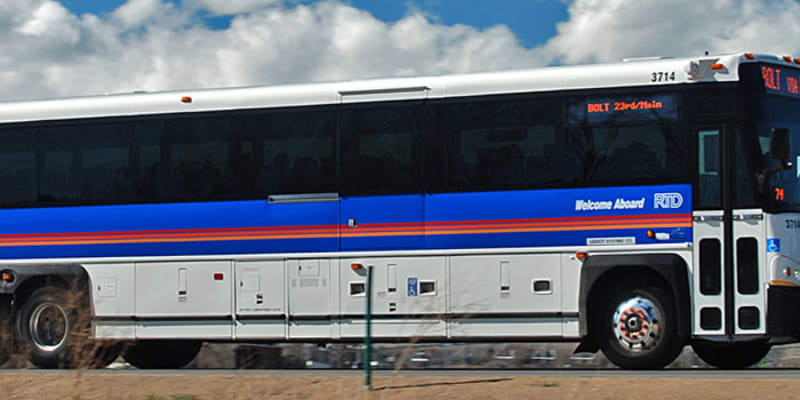
CO 119 Bus Rapid Transit (BRT) Project
The CO 119 Safety and Mobility Improvements Project, a joint project between CDOT and RTD, is designing improvements to make traveling through the corridor safer for all modes and transit travel faster and more reliable. RTD is partnering with the Colorado Department of Transportation (CDOT) and Boulder County to integrate the CO 119 BRT project with other active multimodal projects on the corridor to ensure community members can safely and reliably travel throughout the corridor using their mode(s) of choice. Funding has been secured for implementation of the project and a Construction Manager/General Contractor (CM/GC delivery method) will be used to build the project with construction scheduled to start in 2024.
Bus Rapid Transit (BRT) is an innovative, high-capacity, lower-cost public transit solution that can achieve the performance and benefits of more expensive rail modes. This service has been designed to transport passengers quickly and efficiently to their destinations, while offering the flexibility to meet a variety of local conditions.
BRT system elements can easily be customized to community needs and incorporate state-of-the-art, low-cost technologies that attract more passengers and ultimately help reduce overall traffic congestion.
The CO 119 BRT project includes:
- BRT/queue bypass lanes at signalized intersections along Diagonal Highway
- Coffman Street busway
- Improved transit stops in Boulder/Longmont
- Bikeway along corridor
- A new Park-n-Ride near US 287 and CO 66 in north Longmont
Learn more about construction impacts here.
Project Overview
The CO 119 BRT project will optimize regional connectivity and mobility between Boulder and Longmont by providing improvements that result in faster, safer and more reliable transit travel.
Project Background
Colorado Highway 119 between Longmont and Boulder (the Diagonal) is the second most traveled corridor in Boulder County, serving residents, employees, and visitors from across northern Colorado and the Denver metropolitan area.
Travelers along this vital regional transportation corridor which is the primary connection between Boulder County’s two largest municipalities, face unpredictable travel times. Additionally, CO 119 from Boulder to Longmont is a high crash corridor that produces more severe crashes per mile than any other road in unincorporated Boulder County.
RTD, in collaboration with northwest area elected officials, business leaders, and public agencies, completed a comprehensive study that evaluated the viability of bus rapid transit (BRT) along CO 119 between Boulder and Longmont. The study recommended cost-effective mobility improvements to address the growing congestion and travel demand that includes a 2-pattern BRT route and BRT/managed lanes. The study also gauged environmental impacts, multimodal access, transit reliability, and transit travel time.
In 2019, the RTD Board of Directors accepted the Multimodal Corridor Vision Plan for the CO 119 corridor as defined in the Planning and Environmental Linkages (PEL) Study. RTD has committed $33 million to fund transit elements of the corridor, including BRT stations, Park-n-Rides and enhanced bus stops. RTD’s total contribution is $19 million ( $5 million as a Denver Regional Council of Government Transportation Improvement Program grant match towards the queue bypass lanes at CO 52, and $14 million towards BRT stations and Park-n-Rides along the corridor). The remaining $14 million will be used for local BRT stops in Boulder and Longmont, and the new Park-n-Ride in Longmont. CDOT and local stakeholders have also provided additional funding for the corridor.
Partner News
Commuting Solutions, in collaboration with the City of Boulder, Boulder County, the City of Longmont, RTD, and CDOT, is excited to announce the completion of the CO 119 Branding and Wayfinding Project as part of the broader CO 119 Safety, Mobility, and Bikeway Project.
How bus bypass lanes work
Colorado Highway 119 Vision Plan
Project Status
Project Updates
Upcoming Public Webinar
RTD to host public webinar for future Boulder to Longmont Bus Rapid Transit (BRT) service along CO 119 BRT
RTD is hosting a virtual public informational webinar May 5 and 6 and online public survey throughout May and June regarding future Bus Rapid Transit (BRT) service between Boulder and Longmont.
The webinar will offer details about proposed stations, stops, frequencies and service levels for the two Diagonal Flyer routes (DF1 and DF2) that will operate along the CO 119 corridor, also known as the Diagonal, when the BRT begins operating service in 2027.
Participants can access the Zoom meeting link on the Community Events page of the RTD website. Three time slots are offered for the online webinar:
- Monday, May 5, noon-1 p.m.
- Monday, May 5, 5:30-6:30 p.m.
- Tuesday, May 6, 5:30-6:30 p.m.
The webinar is an informational meeting with no public comment scheduled during the session. Customers are invited to share feedback on the proposed DF1 and DF2 routes through a service hours and frequency online survey that will be offered during May and June. To take the survey, scan the QR code below, or click this link.
RTD wants to hear from you. Take a survey about proposed stops and service levels

Customers interested in providing feedback on frequency and service hours are encouraged to complete the survey that will be available online at https://www.rtd-denver.com/about-rtd/projects/co-119-bus-rapid-transit-brt-project.
RAISE 2023 Awardee!
The CO 119 corridor partners (Boulder County, CDOT, and RTD) received $25 million in federal Rebuilding American Infrastructure with Sustainability and Equity (RAISE) grant funding to construct multimodal improvements at CO 119 and Hover Street.
Visit the USDOT announcement to learn more.
The RAISE 2023 Fact Sheet can be found here.
CDOT/RTD Design/Construction Timeline
- CMGC Advertisement/Procurement: Q1-Q4 2023
- Final Design: Q4 2023-Q2 2023
- Construction: A3 2024-Q1 2027
- Begin CP 1: Q3 2024
- Begin CP 2: Q1 2025
- Begin CP 3: Q4 2025
- Construction Complete: Q1 2027
RTD Service Development, Design and Construction
- BRT Final Design: Q1 2023-Q1 2025
- Service Development: Q4 2024-Q1 2027
- BRT Construction: Q4 2024-Q2 2026
City of Boulder Related Projects
- Downtown Boulder Station Expansion Project: Q4 2024-Q2 2025
- 28th Street: Iris to Canyon: Q3 2024-Q4 2025
- 28th Street and Colorado Avenue Intersection: Q2 2023-Q4 2024
- 30th Street: Arapahoe to Colorado: Q1 2024-Q4 2024
City of Longmont Related Projects
- Boston Avenue Bridge: Q3 2023-Q2 2025
- Coffman Phase I: Q2 2024-Q2 2026
- Coffman Phase II Design: Q1 2024-Q2 2025
- Coffman Phase II Construction: Q3 2025-Q3 2026
- Boston Avenue Railroad Crossing: Q4 2024-Q4 2025
- First and Main Mobility Hub: Q4 2024-Q4 2026
- CO 110/Hover Intersection: Q2 2025-Q4 2026
Resources